Ranking on search engines now requires websites to establish themselves as true authorities in their niche.
And establishing yourself as an authority in your niche is what Topical Authority refers to in SEO.
But how do you build topical authority? How does it improve search rankings? And how to measure your website’s topical authority?
This guide answers all that and more.
But first, let’s answer exactly what topical authority is and why it’s important for SEO.
What Is Topical Authority?
Topical authority in SEO refers to how much Google trusts your website to be an expert on a particular subject.
If you’re always publishing insightful, well-researched content, Google and other reputable search engines start deferring to you.
Technically, topical authority is an algorithm that decides whether your content is worth ranking for queries regarding a particular niche.


Never Worry About AI Detecting Your Texts Again. Undetectable AI Can Help You:
- Make your AI assisted writing appear human-like.
- Bypass all major AI detection tools with just one click.
- Use AI safely and confidently in school and work.
For example, what site often shows up in search results when you’re looking for statistics on a subject? Statista, right?
That’s because Statista has earned itself a name in the field of statistics by regularly posting data-backed insights.
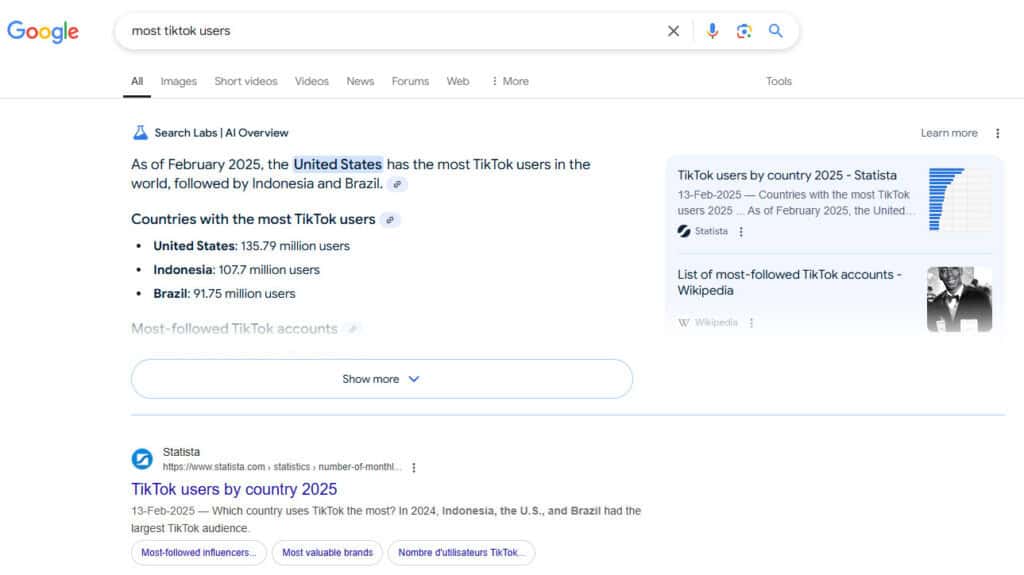
But how exactly did Statista reach there? Well, there’s no official rulebook or a formula for how to be an authority on a topic.
However, SEO experts generally agree on one thing: the more comprehensive, high-quality content you produce around a subject, the more authority you build.
That means you’ll need to cover big-ticket topics as well as the niche subtopics that other websites overlook.
And the way to determine which topics sell and which don’t is through keyword research. You’ll require an entire ecosystem of keywords around your niche to base your content on.
Do that with a consistent pace and Google will start to see you as the real deal.
How Google Uses Topical Authority to Rank Websites
Google doesn’t just throw darts at a board to decide which websites rank highest.
Instead, Google’s system looks at a bunch of signals to determine if your site is the go-to source for a specific topic.
Some of those signals are:
- Is Your Site the Go-To for a Topic or Location? Google checks if your site is notable for a particular topic or location. For example, if you’re searching for the best pizza in Chicago, Google isn’t going to show you a blog written by someone who’s never left Nebraska. It’s going to prioritize sites that are known for covering Chicago food scenes, like local food critics or well-known restaurant guides.
- Are You Breaking News or Just Rehashing It? Are you the one breaking the news, or are you just copying and pasting what everyone else is saying? Original reporting matters to Google. In 2022, Google even introduced a Highly Cited label to highlight stories that have been referenced by many sources.
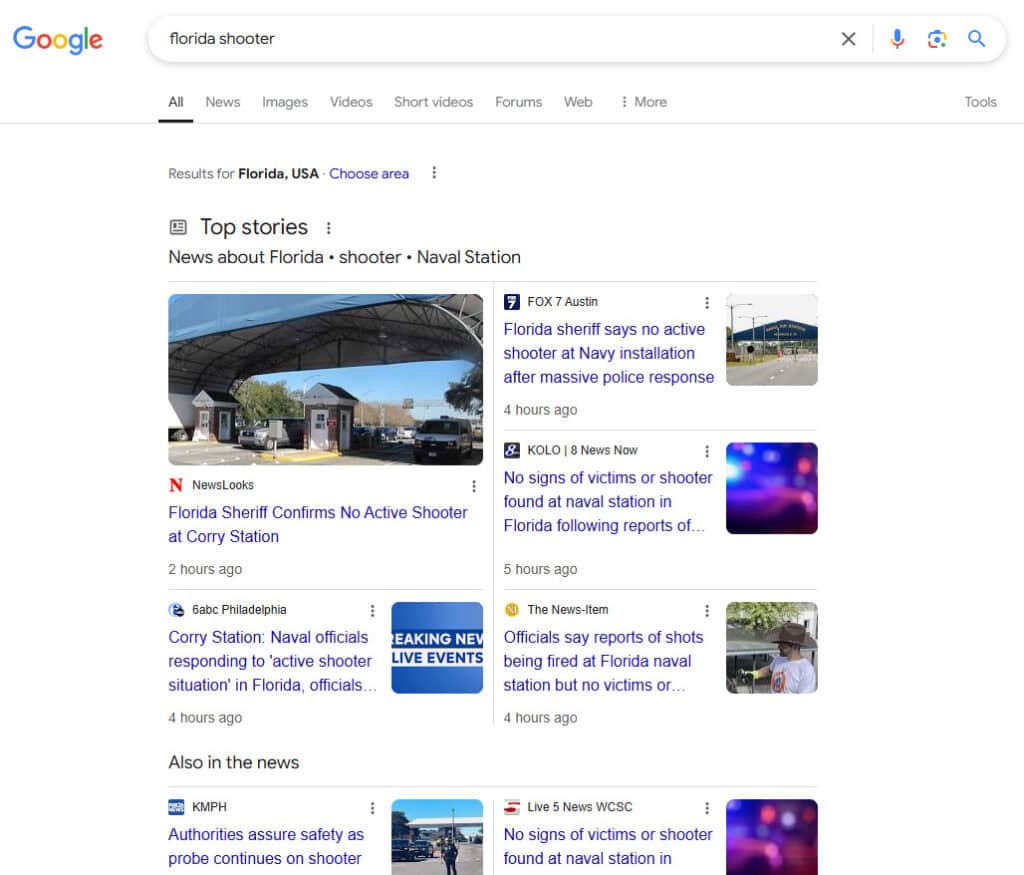
- What’s Your Reputation? Nobody trusts a site with a shady, clickbaity reputation. Google feels the same way. Its systems dig into your site’s history to see if you’ve consistently produced high-quality content. For example, if you run a health website and your articles are regularly cited by medical professionals or organizations, Google is going to see you as a reliable source. That’s the case with the National Institutes of Health (NIH) website.
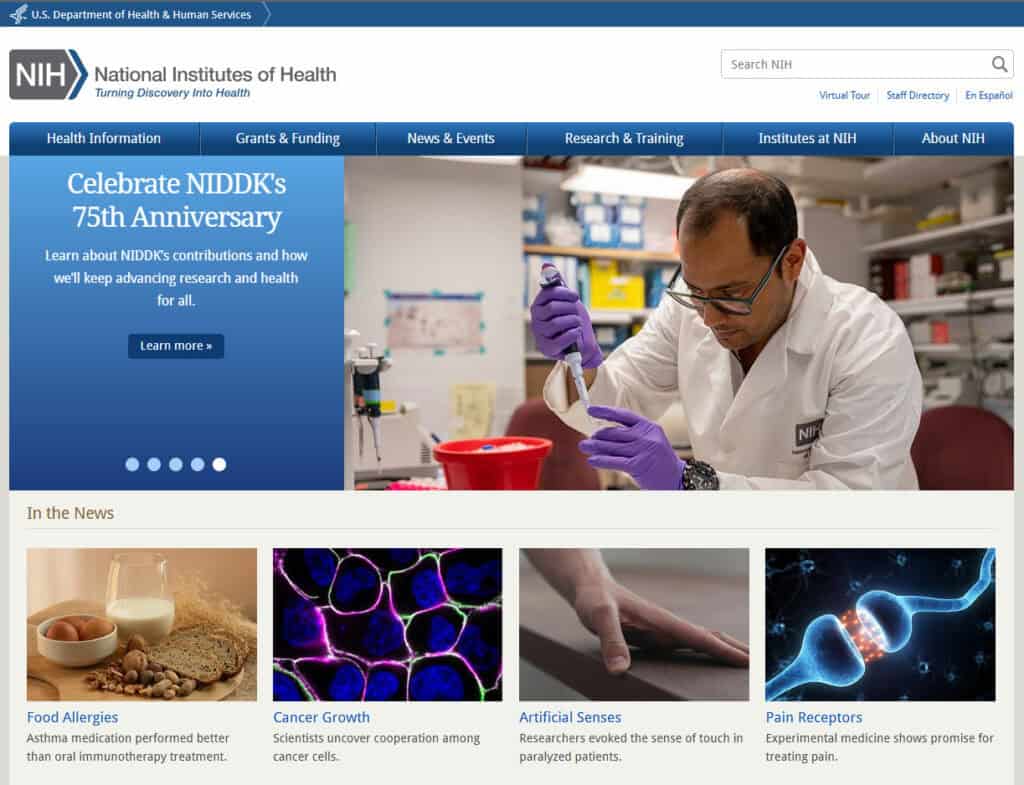
Why Topical Authority Is Important for SEO
If you care about search rankings, you care about topical authority. It’s that simple.
SEO today involves proving to Google that your site is a trustworthy, expert source on a subject.
And when you establish yourself as an authority, the benefits go beyond just higher rankings.
Topical Authority Builds Long-Term Trust
When search engines recognize your expertise, your content has a better shot at ranking consistently rather than fluctuating with every algorithm update.
This means a more stable, sustainable source of organic traffic. It also builds trust with users.
People are more likely to click on and return to sites they recognize as reliable sources of information.
Natural Link-Building
When you’re seen as an authority, other websites are more likely to reference and link to your content.
These backlinks act as votes of confidence that reinforce your credibility in Google’s eyes.
And since high-quality backlinks remain a major ranking factor, topical authority indirectly boosts your SEO from multiple angles.
Less Reliance On Paid Advertising
When your site ranks well organically, you don’t have to spend as much on ads to stay visible.
Over time, this can save businesses a significant amount of money while still driving steady, high-quality traffic.
How Topical Authority Improves Search Rankings
To understand why topical authority matters, let’s explore how Google evaluates content quality and prioritizes relevance in its ranking algorithm.
The Role of Expertise, Authoritativeness, and Trustworthiness (E-A-T)
Google uses a framework called E-A-T (Expertise, Authoritativeness, and Trustworthiness) to assess the credibility of content.
This framework is part of Google’s search Quality Rater Guidelines (QRG).
Websites that demonstrate strong E-A-T have a better chance of ranking higher, especially for topics that require a high level of accuracy, such as finance, health, and legal advice.
- Expertise refers to the depth of knowledge demonstrated in content. Your content should reflect industry knowledge, professional experience, or lived insight. For example, a medical website should have content written or reviewed by licensed professionals, while a product review site might gain credibility through hands-on testing and real-world experience.
- Authoritativeness is built through reputation. One of the strongest signals of authority is backlinks from reputable websites in the same niche. When well-known sources link to a page, it signals to Google that the content is valuable and reliable i.e. a cybersecurity blog gaining mentions from industry leaders like Microsoft or IBM will carry more weight than one without such references.
- Trustworthiness is the basis of both expertise and authority. Google evaluates trust through signals such as accurate information, secure website protocols (HTTPS), transparent author credentials, and positive user feedback. Websites dealing with sensitive topics, especially in the “Your Money or Your Life” (YMYL) category, must maintain the highest trust levels to rank well.
How Google’s Algorithm Prioritizes Topic Relevance
Google’s ranking algorithm prioritizes content that demonstrates deep relevance to a user’s search query.
While keywords play a big role here, simply stuffing them into content isn’t a good strategy, and it no longer works either.
Instead, Google evaluates topic relevance based on a combination of structured content, contextual connections, and user engagement signals.
- How well a webpage covers a topic: A site that provides surface-level coverage may struggle to rank against a competitor that offers in-depth explanations, supporting resources, and related subtopics.
- How well pages interlink within a website: A strong topical authority map—where pillar pages link to supporting content and vice versa—helps Google understand content relationships. This structure reinforces a site’s expertise in a given field and makes it easier for search engines to determine its credibility.
- User interaction: Google incorporates user interaction data into its relevance assessment. If users frequently engage with a webpage—spending time on it, clicking related links, and returning for more—Google recognizes it as a valuable resource.
How to Build Topical Authority (Step-by-Step Guide)
Enough talking about what is topical authority. Let’s show you how you can build it.
I’ll walk you through the process of building topical authority using Semrush, a leading keyword research tool.
You can use any reputable alternative, the steps will be mostly similar.
Step 1: Identify Topic Clusters in Your Niche
You first need to determine what specific topics your site should cover in depth.
Instead of targeting a broad category like “fitness,” it’s good to look for keywords around a specific sub-niche such as “home workouts for beginners” or “strength training for women.”.
Here’s how to find such keywords using Semrush’s Keyword Strategy Builder:
- Enter seed keywords: Open Keyword Strategy Builder and input a few broad terms related to your niche (e.g., home workouts, strength training, yoga for beginners).
- Select your target location: Choose the country or region where your audience is based.
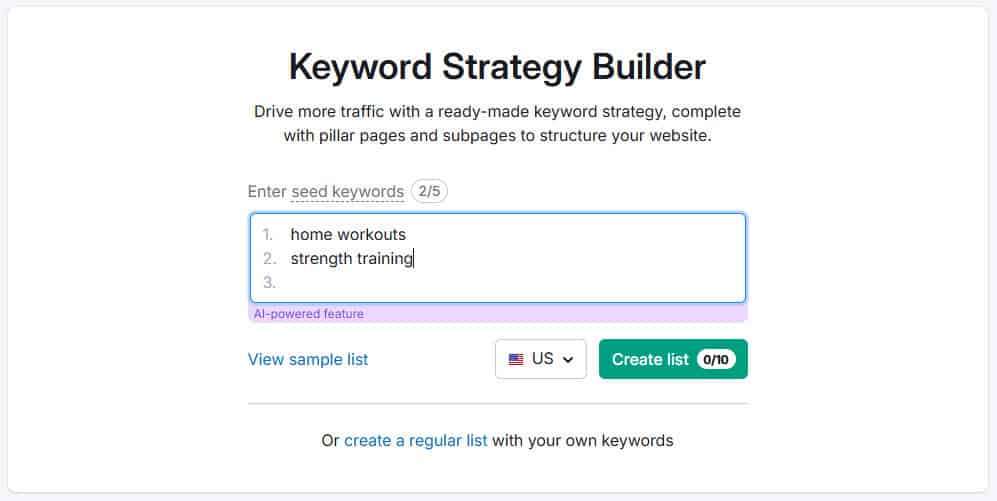
3. Click “Create List”: The tool will generate a structured list of pillar topics (broad themes) with their relevant subpages listed beneath them. This can take a few minutes and will be available under the Pages Details section
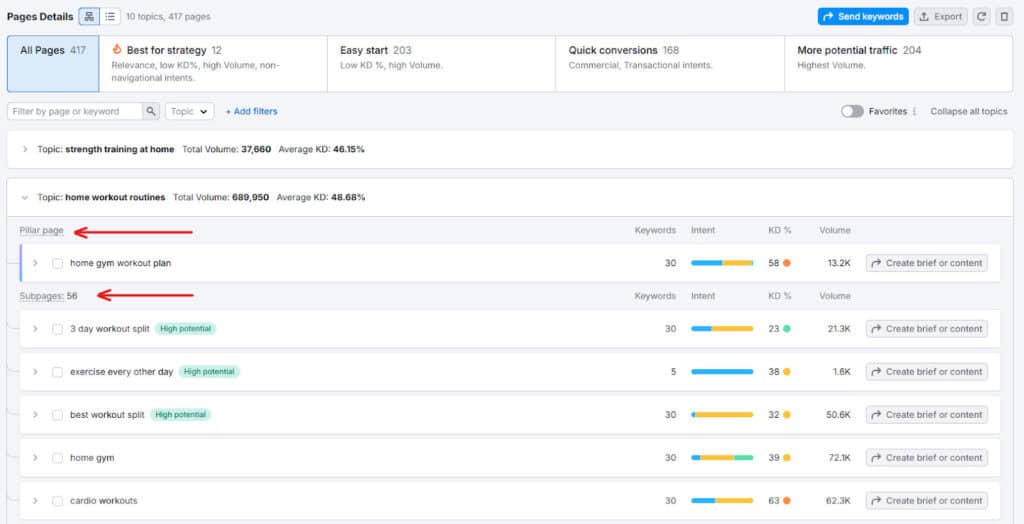
4. Expand the topic clusters: Click on the arrow next to any pillar page or subpage to view keyword clusters. Clusters are groups of related keywords that share user intent and should be included in your content.
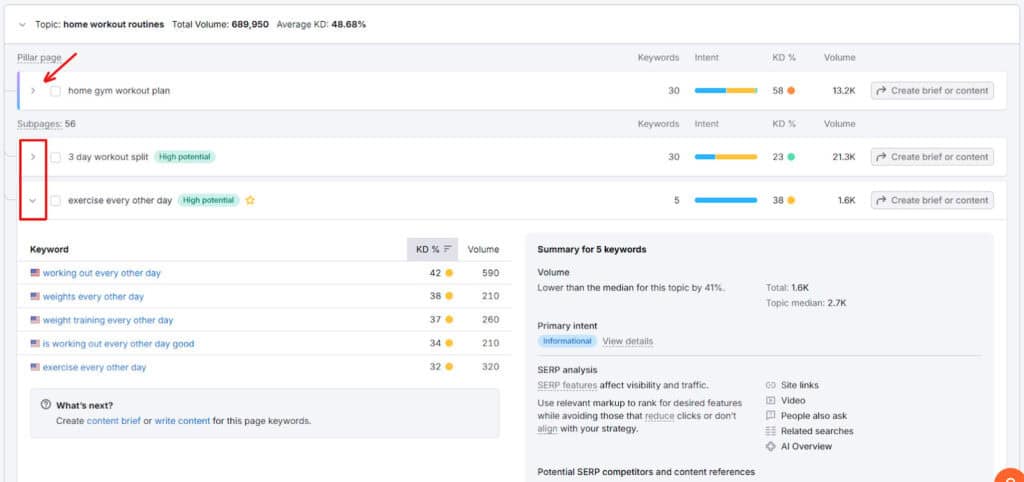
Step 2: Perform Topic-Based Keyword Research for Expansion
Topical authority is built over time, so you should be continuously expanding your content coverage.
And for that, you need a steady pipeline of keyword-driven content ideas.
Here’s how to use Semrush’s Keyword Magic Tool to gather those ideas:
- Enter a broad topic: Go to Keyword Magic Tool from the side panel, type in a general keyword related to your niche, and hit Search. The tool will generate plenty of keywords based on your seed keyword.
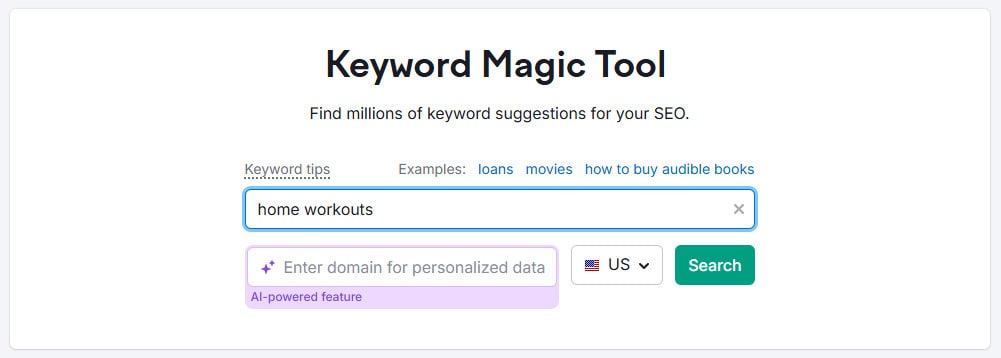
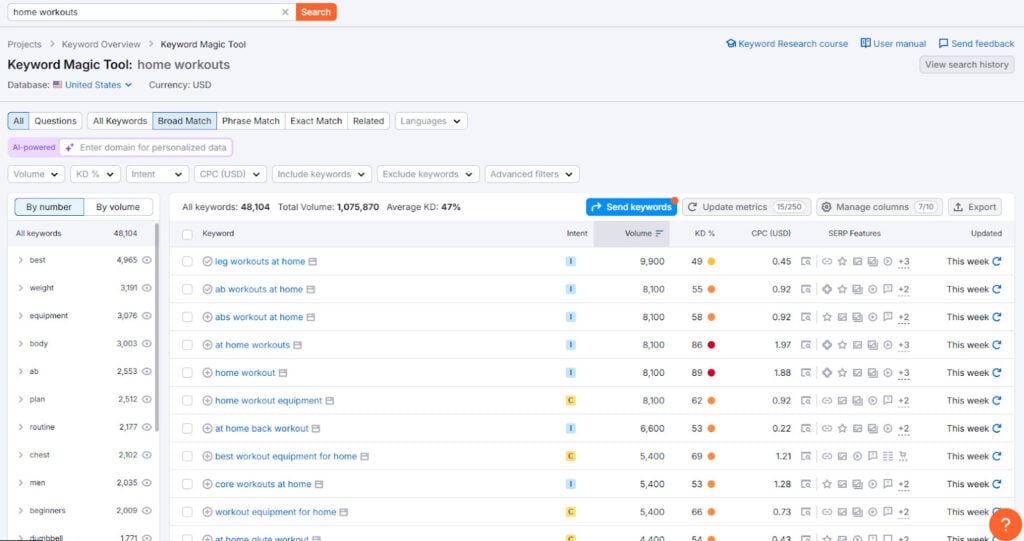
2. Filter results using topical groups: On the left-hand panel, click on specific subgroups like best, equipment, or beginners to find more refined keyword opportunities.
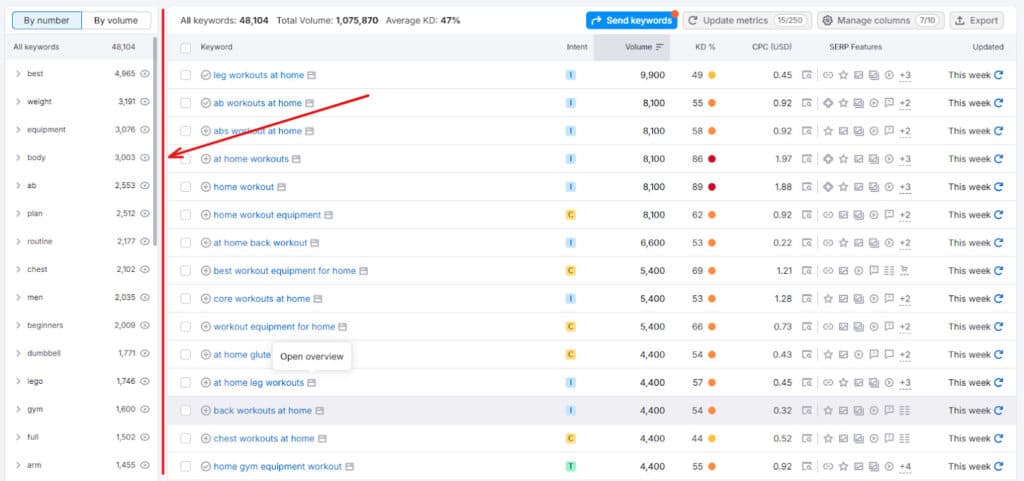
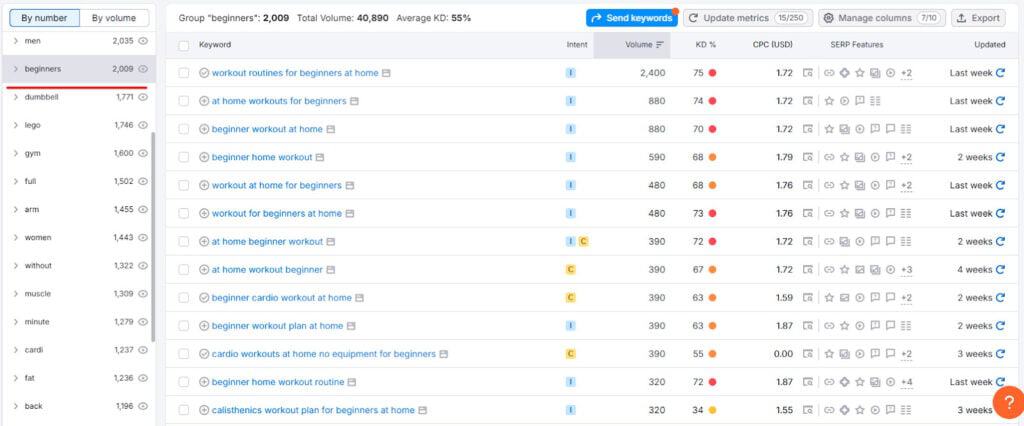
3. Identify low-competition keywords: Your best bets are keywords with a high volume and lower-than-average keyword difficulty (KD%). Use the Keyword Difficulty (KD%) filter to find terms that are easier to rank for. Keywords with KD% between 0-49 are generally considered good for organic ranking.
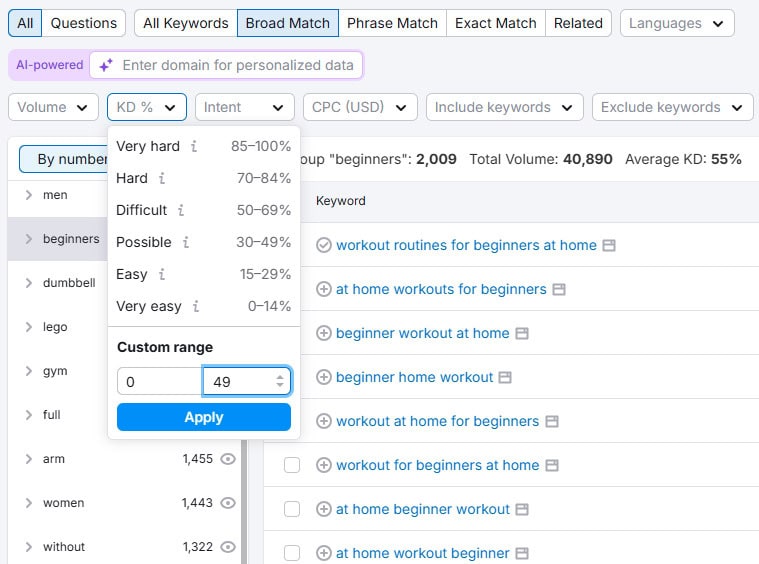
4. Enter your desired KD% range and press apply to activate the filter. This will display the easiest keywords within that range.
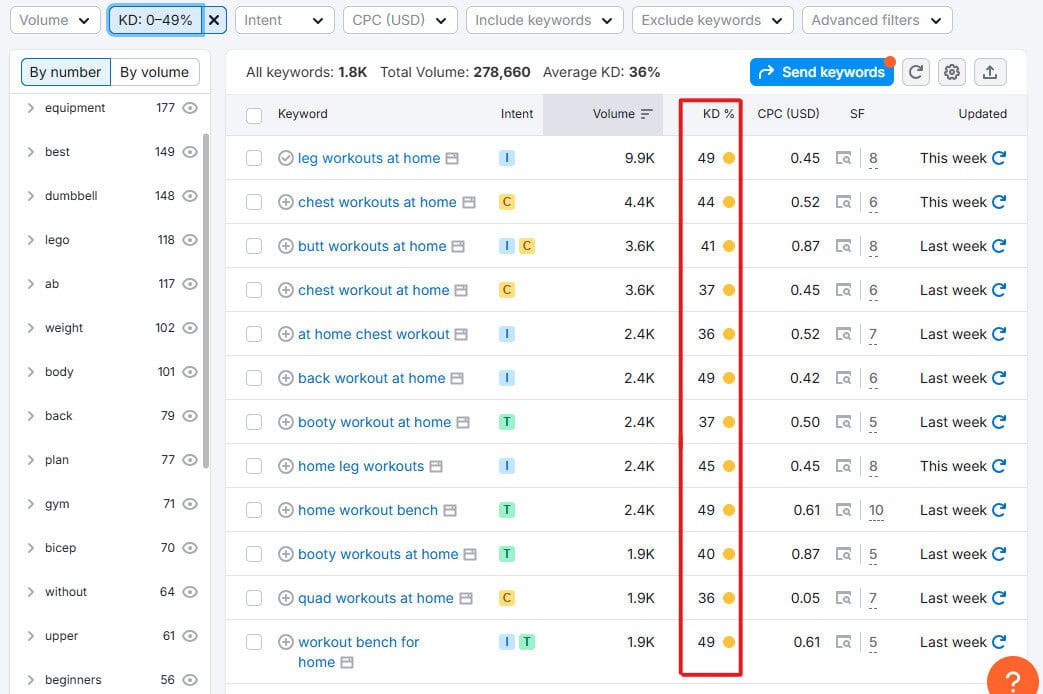
5. Save relevant keywords: Click the “+” symbol next to a keyword to add it to your keyword list in the Keyword Strategy Builder.

Step 3: Conduct a Competitive Backlink Analysis
Building topical authority also involves strengthening your site’s credibility with high-quality backlinks.
To identify opportunities for acquiring relevant backlinks, Semrush’s Backlink Analytics tool can help you analyze competitors’ link profiles and discover sites that might link to your content.
- Open the Backlink Analytics tool and enter the domain of a direct competitor (preferably one that already ranks well for your target topics). Click “Analyze” to pull up the full backlink profile of the competitor’s site. Let’s say I’m Nike and want the backlink profile of my rival, Adidas.

2. Once the report loads, go to the “Referring Domains” tab. Here, you’ll see a list of websites linking to your competitor’s content.
To filter for the most relevant backlinks, use the Authority Score (AS) metric (higher scores indicate more reputable sites). If you want to find potential link-building opportunities with less competition, sort by Follow links to see sites passing the most link equity.
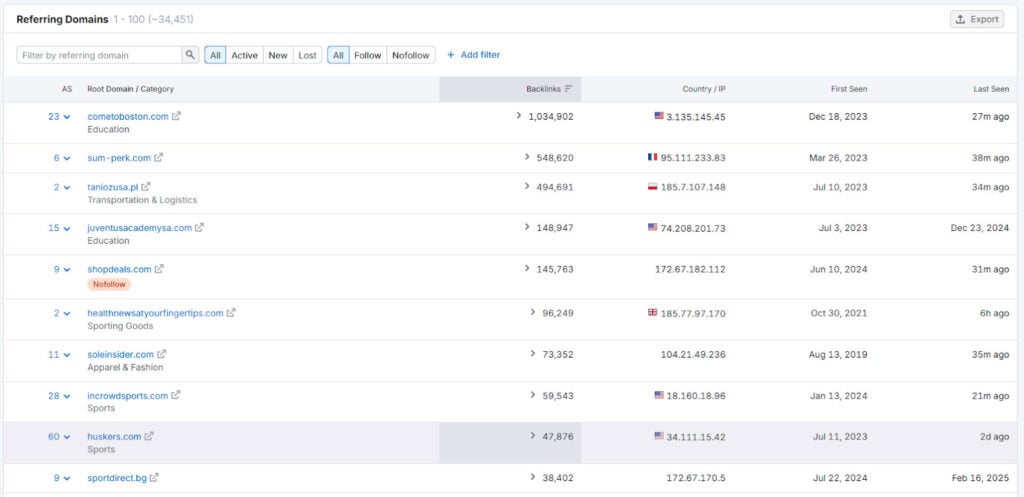
3. For a better approach, scroll to the “Indexed Pages” section. This will show which competitor pages have the most backlinks.
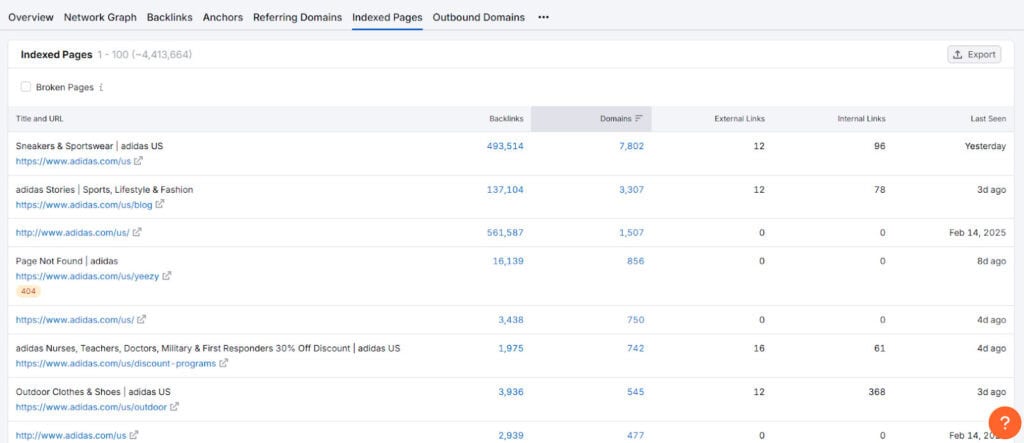
4. Click on the number of Domains for any high-ranking page to see exactly where those links are coming from.
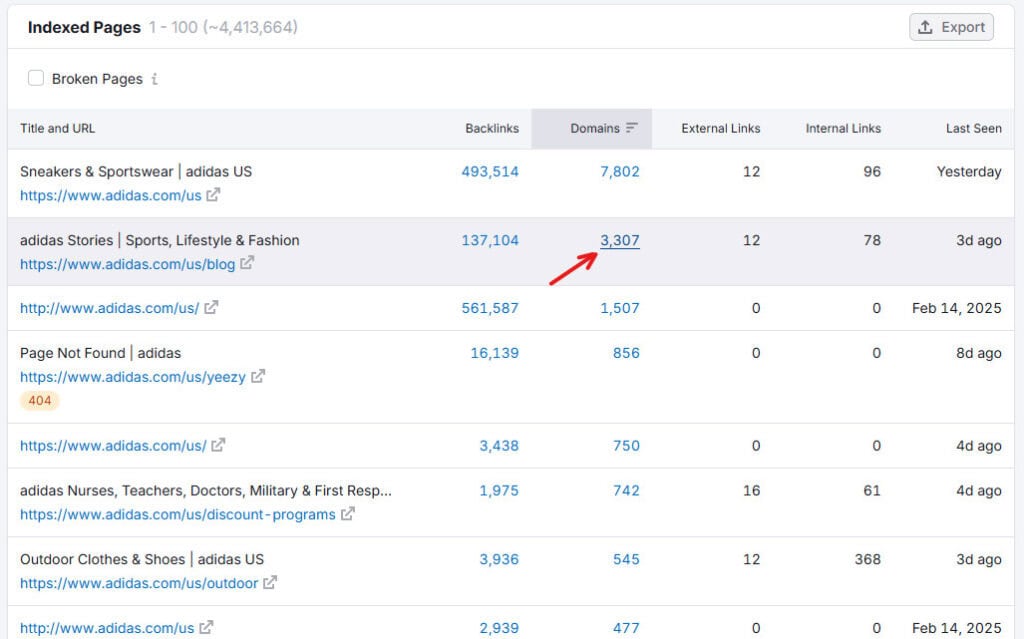
For example, Adidas’s blog page is being referred to by the following websites mostly:
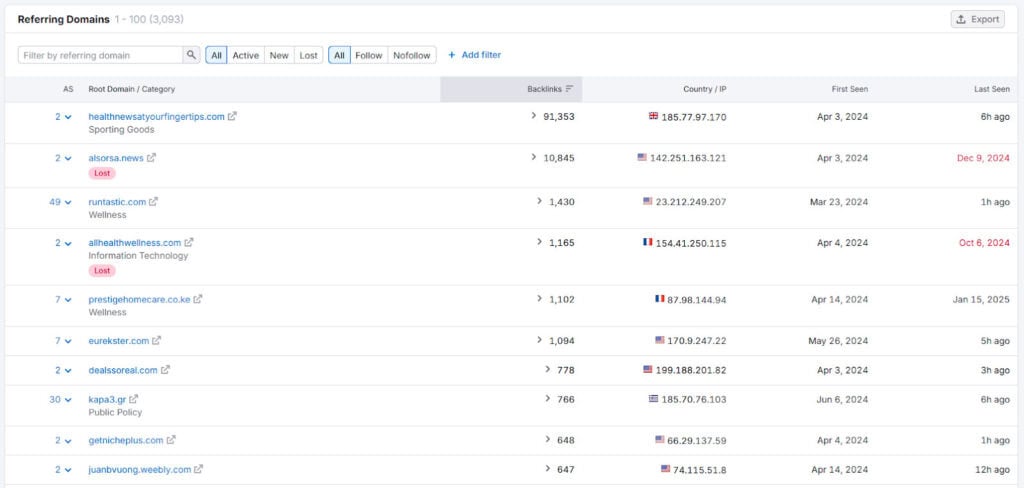
If a competitor’s blog post on a topic similar to yours has earned strong backlinks, this signals an opportunity for outreach to the referring websites.
You can either create a superior version of that content (Skyscraper Technique) or reach out to those sites with an appealing pitch, offering your content as an additional resource.
Once you’ve identified relevant backlink opportunities, document them in a list. Then, begin personalized outreach to request backlinks by emphasizing the unique value of your content.
Step 4: Create High-Quality Content
The last move is to create content, but not just any content.
If you want to build topical authority, you need to write content that actually solves problems.
Take pillar pages as your starting point. These are the in-depth guides that cover a topic from every angle.
For example, if you’re running a tech blog, a pillar page might be something like The Complete Guide to Building Your First Gaming PC.
Our AI SEO Writer can be of huge help here. Be it how-to guides, listicles, or any other type of article, the SEO Writer can write it all while also incorporating SEO keywords provided by you.
Once your pillar page is up, build around it with supporting content. These are the smaller, more specific pieces that explore subtopics.
Sticking with the gaming PC example, your subpages could include:
- How to Choose the Right Graphics Card for Your Gaming PC
- Top 5 Budget-Friendly CPUs for Gamers
- Common Mistakes to Avoid When Building a Gaming PC
Each of these pieces should target long-tail keywords and match what users are actually searching for e.g. giving readers a step-by-step guide, not a vague list of specs.
While you’re at it, you can’t afford to ignore internal linking.
Internal linking is how you connect your pillar page and its supporting content.
Every subpage should link back to the main guide and vice versa to create a tight-knit topic cluster.
For example, the same The Complete Guide to Building Your First Gaming PC article, could internally link to Top 5 Budget-Friendly CPUs for Gamers.
Each link strengthens the overall structure of your blog section and helps Google understand how everything fits together.
Plus, it spreads that sweet, sweet link juice or equity around, which is always a win.
Step 5: Keep Content Up to Date
Finally, don’t let your content gather cobwebs.
Google loves fresh, updated info, so make it a habit to revisit your articles and update them anew.
However, make sure enough time has passed (e.g. a year) since you posted those articles.
Otherwise, writing on the same keyword multiple times in a short time window can lead to Keyword Cannibalization i.e. both will fight each other for ranking.
Updating a topic can involve adding new stats, tweaking outdated sections, and throwing in some fresh insights to keep things relevant.
Nobody wants to read a guide on building a gaming PC that still recommends a GPU from 2015, right?
Topical Authority vs. Domain Authority: What’s the Difference?
Domain Authority (DA) is your website’s popularity score.
It’s a metric that predicts how well your site might rank in search results compared to competitors.
For example, if your DA score is 60 and your competitor’s is 40, you’re probably in a better position to rank higher.
Topical Authority, on the other hand, measures how much Google trusts your site’s content to be an expert on a specific topic.
It is granular, not about your entire site.
It evaluates how well you cover a particular subject.
You could have a low DA but still dominate a niche if your content is top-notch and hyper-focused.
| Aspect | Domain Authority | Topical Authority |
| Definition | A metric predicting a site’s ranking potential based on backlinks, domain age, and other factors. | A concept measuring a site’s expertise and authority on a specific topic. |
| Scope | Broad—applies to the entire domain. | Narrow—focuses on a specific niche or topic. |
| Key Factors | Backlinks, domain age, overall content quality, user experience, brand signals. | Depth of content, relevance, user intent, internal linking, and topic coverage. |
| When It Matters Most | For competitive, broad topics. | For niche, specific topics |
How DA & Topical Relevance Work Together for Rankings
Topical authority and domain authority are deeply interconnected.
A website with high DA will find it easier to rank content quickly simply because search engines already trust it.
However, a strong DA doesn’t automatically mean a site has topical authority in every subject it covers.
For instance, a general news website with high DA may cover multiple topics, but that doesn’t mean Google sees it as an expert in, say, personal finance.
Meanwhile, a smaller site that focuses exclusively on financial planning and publishes in-depth, well-researched content may build strong topical authority even if its overall DA is lower.
The path to high DA also runs through topical authority.
Websites that consistently publish authoritative content on a particular subject tend to attract more backlinks over time, naturally increasing their Domain Authority.
Likewise, if a high-DA website covers a topic, it has a good chance of dominating the topic.
How to Measure Topical Authority & SEO Performance
Measuring topical authority requires tracking multiple signals that indicate expertise and trust within a subject area.
Here are some key methods to gauge topical authority SEO:
- Keyword Visibility: If your content consistently ranks well for related keywords within a topic, it’s a sign that search engines recognize your expertise. Tools like Semrush’s Keyword Overview can help measure this by analyzing how well your site performs for topic-specific queries.
- Backlink Profile: Earning links from authoritative, topic-relevant websites signals to Google that your content is a credible resource. Semrush’s Backlink Analytics tool helps track which domains are linking to your content and whether those links are strengthening your topical authority.
- Search Rankings Over Time: A growing presence in search results is a clear indicator that your site is gaining authority. Using a Position Tracking tool, you can monitor keyword rankings and identify whether your topical relevance is improving.
- Organic Traffic Growth: One of the best indicators of increasing authority is a rise in organic traffic, especially from search queries related to your niche. Google Analytics (GA4) is a leading source of insights into traffic trends.
How AI Can Help Build & Optimize Topical Authority
AI can help build topical authority by analyzing vast amounts of content to identify key themes and related keywords.
It can then suggest content ideas that fill content gaps and improve your site’s relevance.
But wait, there’s more. It also helps you fill the gaps. It can analyze top-ranking content, reverse-engineer what’s working, and spit out content briefs that match search intent.
Once that is done, you can use AI to optimize your content for readability, keyword density, and internal linking opportunities.
It can tell you what specific sub-page to link to your pillar page on a broader topic or vice versa.
Lastly, AI can help keep your content fresh. It’ll nudge you to update stats, swap outdated examples, and add new insights because nothing screams authority like a blog post that’s still relevant two years later.
How AI Can Help Build & Optimize Topical Authority
Building and maintaining topical authority requires a strategic approach—covering key subtopics, optimizing content structure, and ensuring consistent, high-quality output.
This is where Undetectable AI’s AI SEO Writer becomes a game-changer.
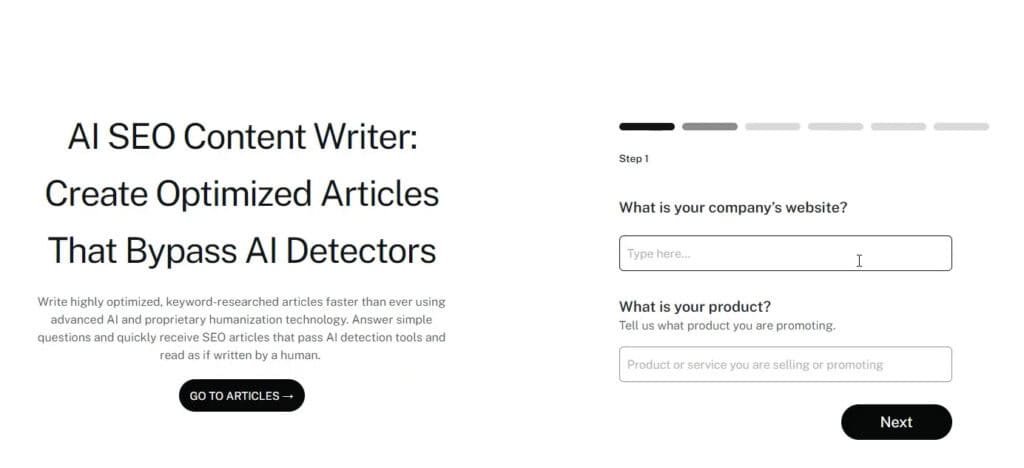
By leveraging AI, you can generate well-researched, semantically rich content that aligns with search intent and reinforces your site’s expertise.
Our tool helps you map out topic clusters, optimize internal linking, and create authoritative articles faster—without compromising quality or authenticity.
With AI-powered assistance, you can scale your content strategy efficiently, stay ahead of competitors, and solidify your position as a trusted source in your industry.
FAQs About Topical Authority
How Long Does It Take to Build Topical Authority?
Building topical authority typically takes several months to a year, depending on how consistently you publish high-quality content.
The trick is to cover topics in-depth, link content strategically, and gradually establish trust with search engines.
Does Topical Authority Replace Backlinks for SEO?
No! Backlinks still matter. While topical authority helps you rank for relevant topics, backlinks signal credibility and trust.
The best strategy combines both strong content depth and authoritative links to improve rankings.
How Many Articles Do I Need to Build Topical Authority?
There’s no magic number, but focusing on 3-4 topic clusters at a time should be good.
Start by creating pillar content for each cluster, then expand with supporting articles. Aim to cover a topic thoroughly, not just hit a number
Build Topical Authority Faster with AI-powered SEO
Establishing topical authority is essential for long-term SEO success. That’s your only solid solution to outrank competitors in search results consistently.
This guide walked you through the process, but implementing it at scale can be time-consuming. That’s where AI-powered SEO tools come in.
With Undetectable AI’s AI SEO Writer, you can create well-structured, authoritative content faster. This ensures your site builds topical authority while saving hours of manual effort.
Sign up today and start generating content that ranks.
While you’re here, explore our AI Detector and Humanizer in the widget below!
